Related Research Articles

Otto Abels Harbach, born Otto Abels Hauerbach was an American lyricist and librettist of nearly 50 musical comedies and operettas. Harbach collaborated as lyricist or librettist with many of the leading Broadway composers of the early 20th century, including Jerome Kern, Louis Hirsch, Herbert Stothart, Vincent Youmans, George Gershwin, and Sigmund Romberg. Harbach believed that music, lyrics, and story should be closely connected, and, as Oscar Hammerstein II's mentor, he encouraged Hammerstein to write musicals in this manner. Harbach is considered one of the first great Broadway lyricists, and he helped raise the status of the lyricist in an age more concerned with music, spectacle, and stars. Some of his more famous lyrics are "Smoke Gets in Your Eyes", "Indian Love Call" and "Cuddle up a Little Closer, Lovey Mine".
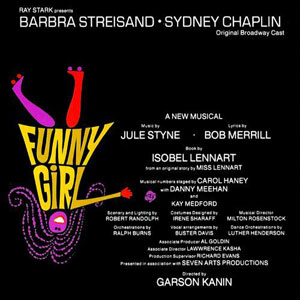
Funny Girl is a musical with score by Jule Styne, lyrics by Bob Merrill, and book by Isobel Lennart, that first opened on Broadway in 1964. The semi-biographical plot is based on the life and career of comedian and Broadway star Fanny Brice, featuring her stormy relationship with entrepreneur and gambler Nicky Arnstein.
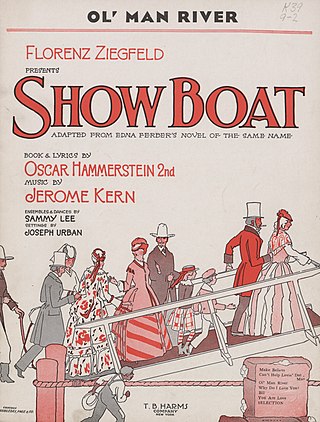
Show Boat is a musical with music by Jerome Kern and book and lyrics by Oscar Hammerstein II. It is based on Edna Ferber's best-selling 1926 novel of the same name. The musical follows the lives of the performers, stagehands and dock workers on the Cotton Blossom, a Mississippi River show boat, over 40 years from 1887 to 1927. Its themes include racial prejudice and tragic, enduring love. The musical contributed such classic songs as "Ol' Man River", "Make Believe", and "Can't Help Lovin' Dat Man".
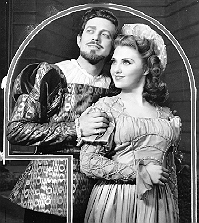
The Firebrand of Florence is a Broadway operetta in two acts, written by Kurt Weill (music), Ira Gershwin (lyrics), and Edwin Justus Mayer and Gershwin (book), based on Mayer's play. The show opened at the Alvin Theatre on March 22, 1945, and closed on April 28 that year after 43 performances. The original production was directed by John Murray Anderson, choreographed by Catherine Littlefield, and conducted by Maurice Abravanel; it featured Lotte Lenya as Duchess.

I'll Say She Is (1924) is a musical comedy revue written by brothers Will B. Johnstone and Tom Johnstone (music). It was the Broadway debut of the Marx Brothers. The initial production premiered in June 1923 at Walnut Street Theatre in Philadelphia, Pennsylvania. before its national tour. A revival of I'll Say She Is, as "adapted and expanded" by the writer-performer Noah Diamond, was seen Off Broadway at the Connelly Theater in 2016.

Till The Clouds Roll By is a 1946 American Technicolor musical film produced by Metro-Goldwyn-Mayer and a fictionalized biopic of composer Jerome Kern, portrayed by Robert Walker. Kern was involved with the production, but died before its completion. It was the first in a series of MGM biopics about Broadway composers.

L'Arlésienne is incidental music composed by Georges Bizet for Alphonse Daudet's drama of the same name, usually translated as The Girl from Arles. It was first performed on 30 September 1872 at the Théâtre du Vaudeville in Paris. Bizet's original incidental music consists of 27 numbers for chorus and small orchestra, ranging from pieces of background music (mélodrames) only a few measures long, to entr'actes. The score achieves powerful dramatic ends with the most economic of means. Still, the work received poor reviews in the wake of the unsuccessful premiere and is not often performed now in its original form, although recordings are available. However, key pieces of the incidental music, most often heard in the form of two suites for full orchestra, have become some of Bizet's most popular compositions.

Billee Taylor, or The Reward of Virtue is "a nautical comedy opera" by Edward Solomon, with a libretto by Henry Pottinger Stephens.

Rip Van Winkle is an operetta in three acts by Robert Planquette. The English language libretto by Henri Meilhac, Philippe Gille and Henry Brougham Farnie was based on the short stories "The Legend of Sleepy Hollow" (1820) and "Rip Van Winkle" (1819) by Washington Irving after the play by Dion Boucicault and Joseph Jefferson.
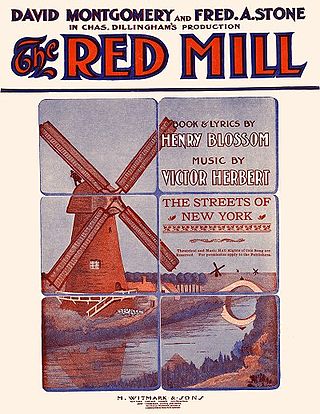
The Red Mill is an operetta written by Victor Herbert, with a libretto by Henry Blossom. The farcical story concerns two American vaudevillians who wreak havoc at an inn in the Netherlands, interfering with two marriages; but all ends well. The musical premiered on Broadway on September 24, 1906, at the Knickerbocker Theatre and ran for 274 performances, starring comedians Fred Stone and David C. Montgomery. It also had a London run and toured extensively, and in 1945 had a long-running Broadway revival. The Red Mill includes the famous songs "Every Day is Lady's Day with Me", "The Streets of New York", "You Never Can Tell About a Woman", and "Because You're You".
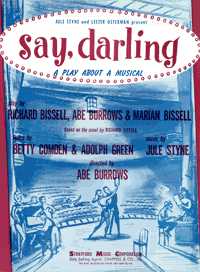
Say, Darling is a three-act comic play by Abe Burrows and Richard and Marian Bissell about the creation of a Broadway musical. While the play featured nine original songs with lyrics by Betty Comden and Adolph Green and music by Jule Styne, all the songs are presented as either rehearsal or audition material.

La fille du tambour-major is an opéra comique in three acts, with music by Jacques Offenbach and words by Alfred Duru and Henri Chivot. It was one of the composer's last works, premiered less than a year before his death. It opened at the Théâtre des Folies-Dramatiques, Paris, on 13 December 1879, and, after a successful initial run, was frequently revived in Paris and internationally, but in recent times has not been among the Offenbach operas most frequently staged.
The Three Musketeers is a musical with a book by William Anthony McGuire, lyrics by Clifford Grey and P. G. Wodehouse, and music by Rudolf Friml. It is based on the classic 1844 novel by Alexandre Dumas, père. Set in France and England in 1626, it recounts the adventures of a young man named d'Artagnan after he leaves home to become a Musketeer of the Guard. The three men of the title are his friends Athos, Porthos and Aramis.

The Cat and the Fiddle is a 1934 American pre-Code romantic musical film directed by William K. Howard based on the hit 1931 Broadway musical of the same name by Jerome Kern and Otto A. Harbach, about a romance between a struggling composer and an American singer. The film stars Ramon Novarro and Jeanette MacDonald in her MGM debut.
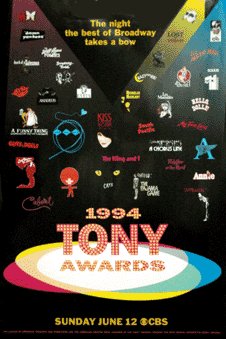
The 48th Annual Tony Awards was broadcast by CBS from the Gershwin Theatre on June 12, 1994. The hosts were Sir Anthony Hopkins and Amy Irving.
Lara Pulver is an English actress. She has played Erin Watts in the BBC spy drama Spooks and Irene Adler on BBC's TV adaptation Sherlock. She won the 2016 Olivier Award for Best Supporting Actress in a Musical in the West End's revival of the Broadway musical Gypsy.
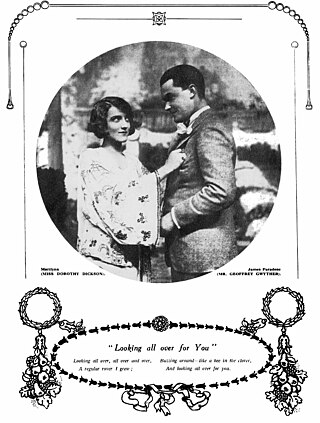
The Cabaret Girl is a musical comedy in three acts with music by Jerome Kern and book and lyrics by George Grossmith, Jr. and P. G. Wodehouse. It was produced by Grossmith and J. A. E. Malone at the Winter Garden Theatre in London's West End in September 1922 and featured Dorothy Dickson, Grossmith, Geoffrey Gwyther, and Norman Griffin in the leading roles.

The Pink Lady is an Edwardian musical comedy composed by Ivan Caryll, which ran for a very successful 312 performances on Broadway in 1911 before becoming an ongoing favorite of regional producers in the Midwest. The story and lyrics by C.M.S. McLellan, about an antiques dealer, were adapted from a French farce, The Satyr, by Georges Berr and Marcel Guiltemand

Cabin in the Sky is a musical with music by Vernon Duke, book by Lynn Root, and lyrics by John Latouche. The musical opened on Broadway in 1940. The show is described as a "parable of Southern Negro Life with echoes of Ferenc Molnár's Liliom and Marc Connelly's The Green Pastures." Several songs from the Broadway musical were released as a 3-record shellac set under the title "The Music of Cabin in the Sky featuring Ethel Waters" in 1940.

The City Chap is a musical comedy with music by Jerome Kern, lyrics by Anne Caldwell and book by James Montgomery adapted from the play The Fortune Hunter by Winchell Smith.
References
- 1 2 Hischak, Thomas S. (1991). Word Crazy: Broadway Lyricists from Cohan to Sondheim. Praeger. pp. 19–24.
- 1 2 3 Dietz, Dan (2018). "The Cat and the Fiddle". The Complete Book of 1930s Broadway Musicals. Rowman & Littlefield. pp. 160–162. ISBN 9781538102770.
- ↑ McSpadden, J. Walker (1936). Light opera and musical comedy. New York: Thomas Y. Crowell Company. pp. 328–329.
- ↑ "Palace Theatre", The Times , March 5, 1932, p. 10
- ↑ The Observer, March 6, 1932, p. 9
- ↑ Kenrick, John (2010). Musical Theatre: A History. Bloomsbury Academic. p. 214. ISBN 9780826430137.
- ↑ Americans in London in the 1930s, original cast recordings, Encore CD ENBO-CD-3/92